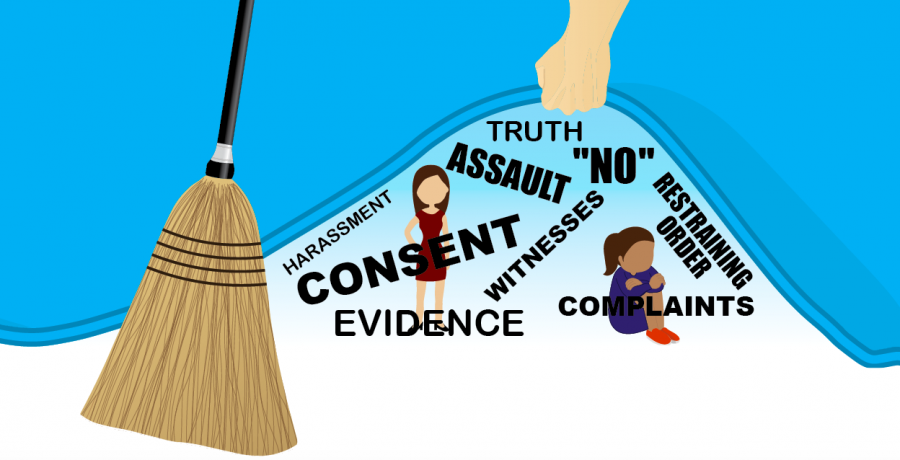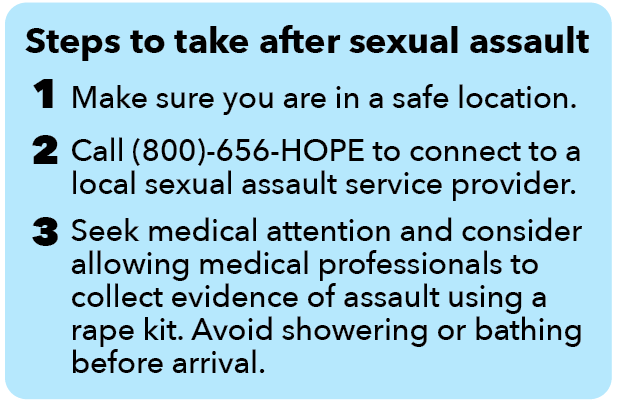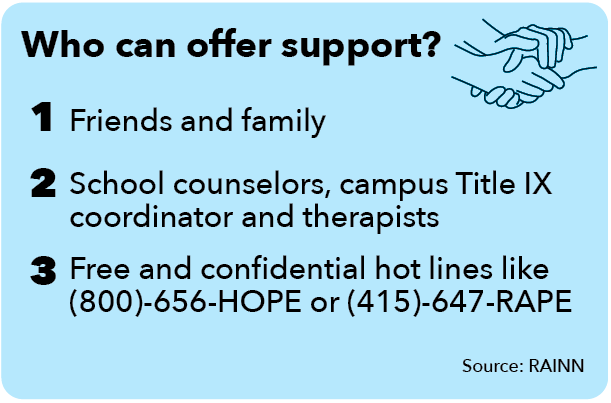College sexual misconduct ignored
This story includes information about a sexual assault. The Broadview has chosen not to use the survivor’s name and has omitted certain details due to ongoing litigation.
What started out to be a friendly college get-together turned into a sexual assault for a female in her early 20s. After reporting the incident to her college, she says she felt victimized all over again.
With colleges’ increased concern about reputation, victimization may become the norm.
Colleges that receive federal funding are required to ensure that no discrimination on the basis of sex occurs in education programs and activities, including sexual assault and harassment, under Title IX of the Education Amendments Act, but new rules proposed by Secretary of Education Betsy DeVos would change the way colleges comply to Title IX.
“If these proposed rules were to go into effect as they’re written, then schools would be allowed — and in many cases required — to ignore students who report sexual harassment,” Shiwali Patel, a Senior Counsel for Education at the National Women’s Law Center, said.
Approximately 20 percent of college women and 15 percent of college men are victims of forced sex during their time in college, according to the National Sexual Violence Resource Center.
Yet, 89 percent of universities reported zero incidents of rape in 2015, according to the American Association of University Women.
Current Title IX processes still raise concern about how colleges respond to complaints, which has led the Office for Civil Rights to have 305 open cases for colleges mishandling reports of sexual violence, according to the Chronicle of Higher Education.
“Universities are not expected to guarantee that no one will ever suffer sexual misconduct on their campus — that’s too much to expect,” Frank LoMonte, Volunteer Senior Legal Fellow at the Student Press Law Center, said. “What they are expected to do is to diligently follow up. When they get a complaint, they’re supposed to take it seriously and act with confidence, and if they don’t do that, that is when you start talking about a hostile environment.”
Under the proposed changes, schools would be required to presume that no harassment occurred until a determination is made.
“Our concern is that this would just exacerbate beratement that women and girls lie about sexual assault, or they’re reporting it because they want attention,” Patel said.
The woman in her early 20s, who claimed she was sexually assaulted by an acquaintance at her university and reported it to her school’s Title IX coordinator, experienced the process first-hand.
“It was awful,” the young woman said. “As I went through the Title IX process, I was very naive and trusted that they had my best interests and were really trying to prosecute him and get all the evidence they could.”
In September 2017, DeVos released a Q&A on Campus Sexual Misconduct to serve as interim guidance after rescinding the 2011 and 2014 guidance that included eliminating the 60-day time frame of investigations and giving schools the responsibility to collect the evidence.
The young woman said she believes her investigator was biased in favor of her assailant.
“The tone and the manner in which this lady spoke to me and asked her very skewed questions was unbelievable,” the young woman said. “She would purposely ask me questions that would confuse me and make me mess up my story.”
The young woman returned to her campus during a school break following the assault to be interviewed because of discrepancies between her statement and her assailant’s. When she received the final report, she was given time to read through it and submit a statement back.
“It was just filled with lies,” the young woman said. “I had to constantly relive my trauma not only from my own perspective but from the perspective of the guy who raped me.”
More than 90 percent of college sexual assaults are not reported at all and between 2 to 7 percent of reported sexual assault cases are false, according to the National Sexual Violence Resource Center.
Under the proposed rules, schools would only be obligated to investigate if victims reported their sexual harassment or assault to a Title IX Coordinator or “any official of the recipient who has authority to institute corrective measures on behalf of the recipient.”
“When you think about who students opt to report to, it’s going to be someone who they trust,” Patel said. “If they’re a student athlete, it might be their coach; it might be their professor. It’s likely not going to be a dean or someone in a higher level who they might not know at all.”
The young woman said it took her several weeks to explicitly tell others she had been raped.
“Telling my parents was, and probably will be, one of the top three hardest things I have ever had to do in my life,” the young woman said. “I was holding back for that reason. I knew that the pain that this would evoke in my family and the suffering isn’t just consolidated to myself. I didn’t want to burden them with something so dire and unbelievably gruesome.”
Under DeVos’s proposed rules, the school would not be required to investigate the young woman’s case because it occurred off-campus.
“Schools would be required to ignore all Title IX complaints that occurred off-campus or outside of a school sponsored program, even if that student is forced to see their harasser or rapist on campus every day,” Patel said about the proposed rules.
Students living in on-campus dormitories and sorority houses are 1.4 times and 3 times, respectively, more likely to be raped than students living off-campus, according to a study published by the National Institute of Health.
“Just because the assault occurred off campus doesn’t mean that the trauma is any less severe,” Patel said. “Their education is still going to be impacted.”
A college woman is twice as likely to be sexually assaulted than robbed, as opposed to all women, who are robbed five times for every four sexual assaults, according to The Rape, Abuse & Incest National Network.
Current rules hold colleges to respond “reasonably” to complaints of sexual harassment, while DeVos’s proposed rules would require colleges to not act “deliberately indifferent” or “clearly unreasonable,” according to the National Women’s Law Center.
“For Betsy DeVos to think that this is a procedural process you can go through by completing steps one, two and three is just unbelievably naive, since this process is anything but ordinal,” the young woman said. “These revisions really are going to protect institutions further. When my dad read them he just started crying. It’s going to hurt the victims.”
The young woman said underreporting is one of the main issues with how colleges handle sexual assault.
“People are only focusing on the fact that sexual assault is happening on universities,” the young woman said. “Yes, that is the root of the problem. However, you have to tackle different barriers on the way. One of these barriers is the fact that every school is underreporting.”
LoMonte says that the vagueness in laws allows schools to interpret them broadly in their favor to keep sexual misconduct under wraps.
“Nobody wants to be known as a campus where a lot of sexual misconduct goes on,” LoMonte said. “That’s a blow to the college’s image. It really comes down to this fixation of promoting a favorable public image and not hurting donations.”
LoMonte says that statues like the Family Educational Rights and Privacy Act need to be rewritten so they are not used to easily conceal sexual misconduct.
“It’s always easier to do your job without public scrutiny, but it’s not the way the law works,” LoMonte said. “The process should be as transparent as humanly possible because that’s the only way the public can have confidence that it works properly. The moment a college opens an investigation, they should be creating a version of the file that is the publicly disclosable.”
Knowledge that sexual assault investigations occur can cause other people to come forward, according to LoMonte.
“Once I found out that [my assailant] has done this to other girls, I thought, ‘This has to end somewhere,’” the young woman said. “I wish someone had done something before me, but the reality is, that did not happen. What matters is what I do from here on out.”
The Department of Education will review over 100,000 comments made by the public before making the ruling on DeVos’s proposal.
“It would not only further traumatize survivors who are trying to seek help, but would discourage many survivors and witnesses from the process,” Patel said. “I just think that they should not be moving forward with the proposed rules at all.”
‘No’ means no
The increase of individuals speaking up about recent and previously undisclosed sexual assaults is bringing attention to how both men and women have a range of understanding about consent.
An individual gives consent by explicit verbal agreement or by a clear statement of “Yes.” Any sexual contact made without the recipient’s affirmative consent is considered sexual assault, according to the United States Department of Justice.
“Sexual assault includes violations of the body or bodily autonomy such as unwanted oral sex, unwanted penetrative sex or any kind of greater sexual touching,” sexual ethics educator Natasha Singh said. “Women are undoubtedly at greater risk for sexual assault and sexual violence, but with that said, boys are victims of sexual assault as well.”
Sexual consent cannot be assumed by body language, non-verbal communication, current relationship status, sexual history or incapacitation such as from intoxication, according to the Centers for Disease Control and Prevention. Fifty-one percent of women report their perpetrators are their intimate partners.
“I think it’s really important to know most sexual assaults take place at home or near the home,” Singh said. “We need to have much more training about how to communicate because oftentimes, there’s a real lack of comfort in speaking directly to one another even between people in otherwise healthy relationships.”
Singh says women and men need to learn how to give or not give consent to sexual experiences and need to be educated on the ways sexual harassment and sexual violence are manifested.
“In terms of safety, it is very important for people to not only focus on how to be safe, but also how to not perpetrate sexual violence,” Singh said. “There was so much emphasis for many years on girls to ‘Keep yourself safe,’ but not enough focus on ‘Don’t be the person that violates somebody.’”
Equal access for young men and women to sexual education that has an emphasis placed on understanding consent could potentially decrease risk of sexual harassment or violence, according to Singh.
“We’re living in a time where everybody’s getting a lot more information about consent, but people have very different ideas of what consent looks like,” Singh said. “I understand why people go to the internet for information, but oftentimes the info ends up creating more stereotypes around gender and creating less progressive attitudes towards sex and sexuality.”
Since private schools have the ability to curate their curriculum and because only 24 states require sex education at public schools, teens and young adults have very different levels of knowledge by the time they graduate high school, according to the National Conference of State Legislatures.
Senior Riley Kramer says that compared to some of her friends who attended different elementary schools, she had a limited sex education that did not cover the topic of consent.
“There was very little sex education at my school,” Kramer said. “We maybe talked once about the different body parts, and I’m pretty sure that was the extent of it. I had to talk to friends and my mom about their experiences to learn
about things.”
Depending on the course and where it is taught, a sexual education program could cover topics such as healthy relationships, personal skills, and sexual health and behavior. Subtopics could include anatomy, puberty, abstinence, contraception and consent.
Of the American students who do receive sexual education, most begin during sixth grade, according to Singh. Many other countries start before the age of 5.
“Many Dutch students report having better consensual first sexual experiences than their American counterparts and the Dutch start their education at age four,” Singh said. “Often, we’re embarrassed to talk about these natural topics, but when you don’t teach a young person, for instance, the names of their body parts, how can they then realize if somebody is treating them inappropriately.”
Girls between the ages of 16 and 19 are four times more likely to experience sexual assault than the general female population, according to the Department of Justice.
“Sexual education is a very taboo topic and a lot of schools are afraid to really discuss it,” Kramer said. “I think that more conversation and more sex education would most likely allow for better communication and prevent some instances of sexual harassment or assault.”
Singh says the inconsistency in sexual education and knowledge about consent becomes especially clear in college.
“By the time you get to college and university you will encounter people who’ve had maybe no sex ed or who have been exposed to very few conversations about healthy relationships,” Singh said, “so there is a lot of ignorance when everybody’s beginning to sexually explore.”
While 46 percent of high schoolers have had some sort of sexual experience, 60 percent of college students are sexually active.
Director of Student Support Annie Egan says while it may be easier to not say anything when someone makes an inappropriate comment or action, young people should learn to speak up in awkward situations and practice giving consent before they enter college.
“When someone makes a sexualized joke or maybe puts an unwanted hand on a woman’s thigh, that woman needs to be able to say ‘That is not funny. That is not what I want,’” Egan said. “It’s very difficult to remove yourself and speak out in an uncomfortable situation if you have zero practice doing it, so practicing recognizing what your voice sounds like when you say ‘No’ is important.”
Knowing what consent is and how to give it, however, is not enough to keep oneself safe. Being under the influence of alcohol or drugs can inhibit one’s ability to make coherent decisions regarding sexual safety, according to Egan, because alcohol and drugs alter brain chemistry, they affect moods, behaviors and thinking.
“Your abilities are compromised when you’re under the influence,” Egan said. “If you are sober it is far easier to be aware of your surroundings, to make quick decisions, to think more clearly and to communicate articulately to somebody else.”
At least half of sexual assaults that take place on a college campus involve alcohol, according to the National Institute on Alcohol Abuse and Alcoholism.
“It’s important that we start talking about things like consent because, unfortunately, people can perpetrate sexual violence and not even think they’ve done anything,” Singh said. “We need to do a much better job of normalizing conversations and making communication direct.”



